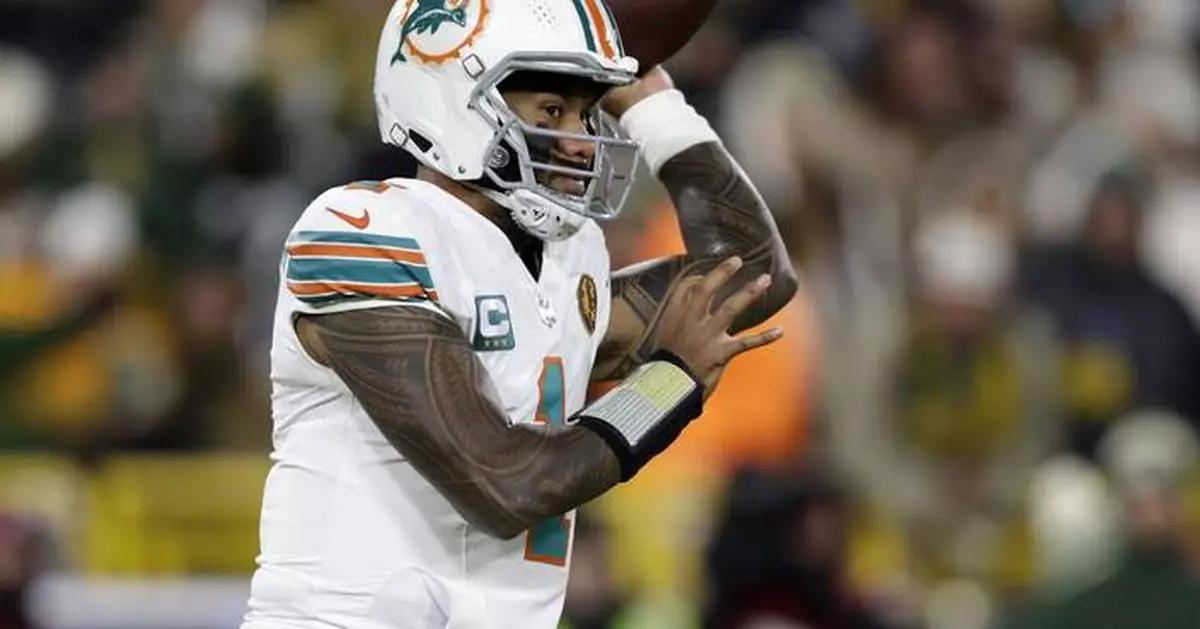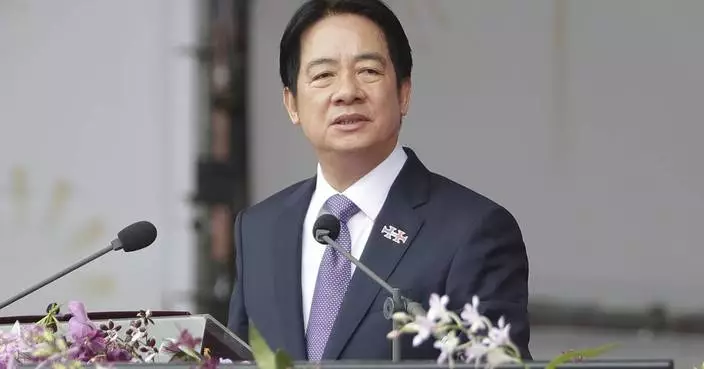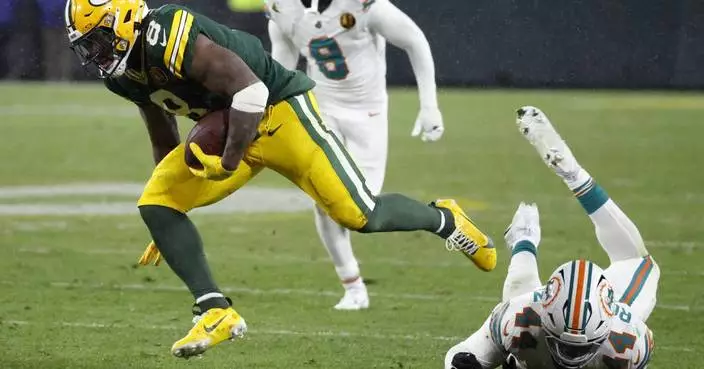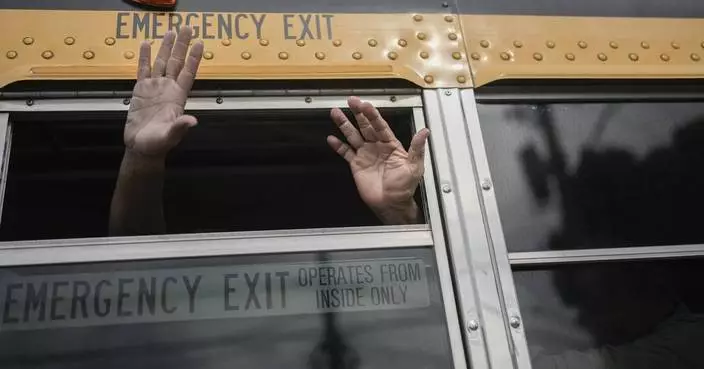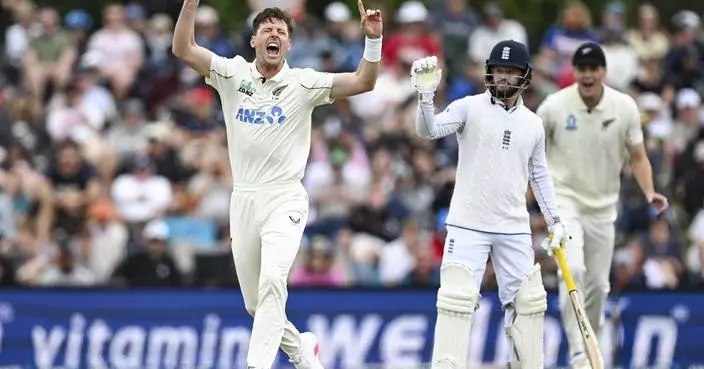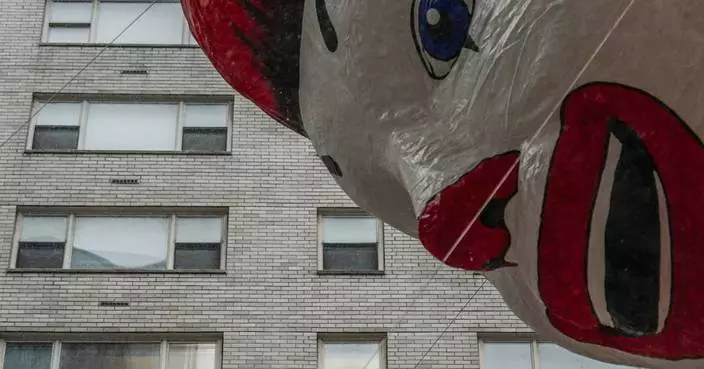GREEN BAY, Wis. (AP) — Tua Tagovailoa had spoken about how the Miami Dolphins had an opportunity this week to change the narrative suggesting they couldn’t play well in freezing temperatures.
But the Dolphins ultimately came up short in the cold once again, as their three-game winning streak ended with a 30-17 loss to the Green Bay Packers on Thursday night amid light flurries.
Click to Gallery
Miami Dolphins running back De'Von Achane scores on a 14-yard touchdown reception during the second half of an NFL football game against the Green Bay Packers Thursday, Nov. 28, 2024, in Green Bay, Wis. (AP Photo/Morry Gash)
Miami Dolphins running back Raheem Mostert (31) tries to break a tackle by Green Bay Packers safety Evan Williams (33) during the second half of an NFL football game Thursday, Nov. 28, 2024, in Green Bay, Wis. (AP Photo/Matt Ludtke)
Green Bay Packers defensive tackle T.J. Slaton (93) celebrates in front of Miami Dolphins offensive tackle Liam Eichenberg (74) after a defensive stop during the second half of an NFL football game Thursday, Nov. 28, 2024, in Green Bay, Wis. (AP Photo/Mike Roemer)
Green Bay Packers defensive tackle Kenny Clark (97) sacks Miami Dolphins quarterback Tua Tagovailoa during the second half of an NFL football game Thursday, Nov. 28, 2024, in Green Bay, Wis. (AP Photo/Morry Gash)
Miami Dolphins quarterback Tua Tagovailoa throws a pass during the first half of an NFL football game against the Green Bay Packers Thursday, Nov. 28, 2024, in Green Bay, Wis. (AP Photo/Matt Ludtke)
The Dolphins (5-7) have lost their last 12 regular-season or postseason games in which the temperature at kickoff was 40 degrees (4.4 Celsius) or lower. The reading at Lambeau Field on Thanksgiving was 27 degrees (-2.7 Celsius), with 10 mph winds and a wind chill of 18.
“We're definitely not going to use that as an excuse,” defensive lineman Calais Campbell said. “I know obviously, with the narratives from years past or whatever, I get it. But today wasn't that bad.”
Packers safety Xavier McKinney said he believed the weather made a difference.
“Obviously, they’re coming from Miami, it’s hot there, and then when you come here and play in that cold weather, you get affected by it,” McKinney said. “So I think it affected everybody on that team.”
Miami’s most recent victory in a game that began with a temperature of 40 degrees or below was a 34-31 overtime triumph at Buffalo on Dec. 24, 2016.
The temperature Thursday was a far cry from what the Dolphins encountered in the wild-card round of the playoffs last year. Miami's 2023 season ended with a 26-7 loss at Kansas City, where it was minus-4 degrees (-20 Celsius) at kickoff with a wind chill of minus-27.
While the weather didn’t seem to have a direct impact on the Dolphins’ play this time, they weren’t nearly as sharp as they’d been throughout a winning streak that had rejuvenated their playoff hopes.
Tagovailoa was 37-of-46 passing for 365 yards and two touchdowns, but he was sacked five times and didn’t get much help. Miami had to play catch-up after the Packers took a 27-3 lead in the third quarter.
“I would say, from my standpoint and our team’s standpoint, we’re not going to use any of that as an excuse for why we didn’t get the start that we wanted,” Tagovailoa said.
A muffed punt by Malik Washington gave the Packers first-and-goal to set up Green Bay’s first touchdown. The Dolphins committed 10 penalties, including six in the first half.
“We weren’t failing to snap the ball before a delay of game or false-starting because of the cold,” coach Mike McDaniel said. “I think the tape will show that, when we watch the tape. But like anything else, eventually you have to overcome it if you’re trying to do anything in this league.”
The Dolphins settled for a field goal on a goal-to-go situation in the first half and failed to score at all after having second-and-goal at the 1 in the fourth quarter.
A defense that already was playing without linebacker Anthony Walker and cornerback Kendall Fuller lost nickel Kader Kohou and cornerback Cam Smith to injuries.
Perhaps it was fitting that in the cold weather, the Dolphins apparently took 2 1/2 quarters to get warmed up.
“When we're playing our best ball, we can beat anybody,” Campbell said. “But today was definitely not our best ball.”
Miami has enough firepower to rally from just about any deficit, and the Dolphins threatened to make this one interesting.
The Dolphins scored a touchdown, forced a punt with a third-and-1 stop of Josh Jacobs and then drove down the field again and had second-and-goal on the 1 early in the fourth quarter.
That last yard proved elusive.
De’Von Achane got stopped on second down. Tagovailoa couldn’t connect with Jonnu Smith on third down and then got sacked on fourth down.
The Packers put away the game from there. And the Dolphins were left out in the cold again, severely damaging their chances of earning a third straight playoff berth.
“As far as season hopes, I would say this one was a tough one for us as a team,” Tagovailoa said. “I know what this game meant to a lot of guys in that locker room. I wouldn't say the dream's dead for our team just yet. Anything can happen in this league.”
The Dolphins have essentially no margin for error, which means they probably must figure out how to win in cold weather to have any shot at getting back to the playoffs. Miami closes the regular season with consecutive road games against the Cleveland Browns and New York Jets.
“I think our guys will look forward to executing in the cold weather the next opportunity, because I think they know they can,” McDaniel said. “So they need to, and they want to.”
AP NFL: https://apnews.com/hub/NFL
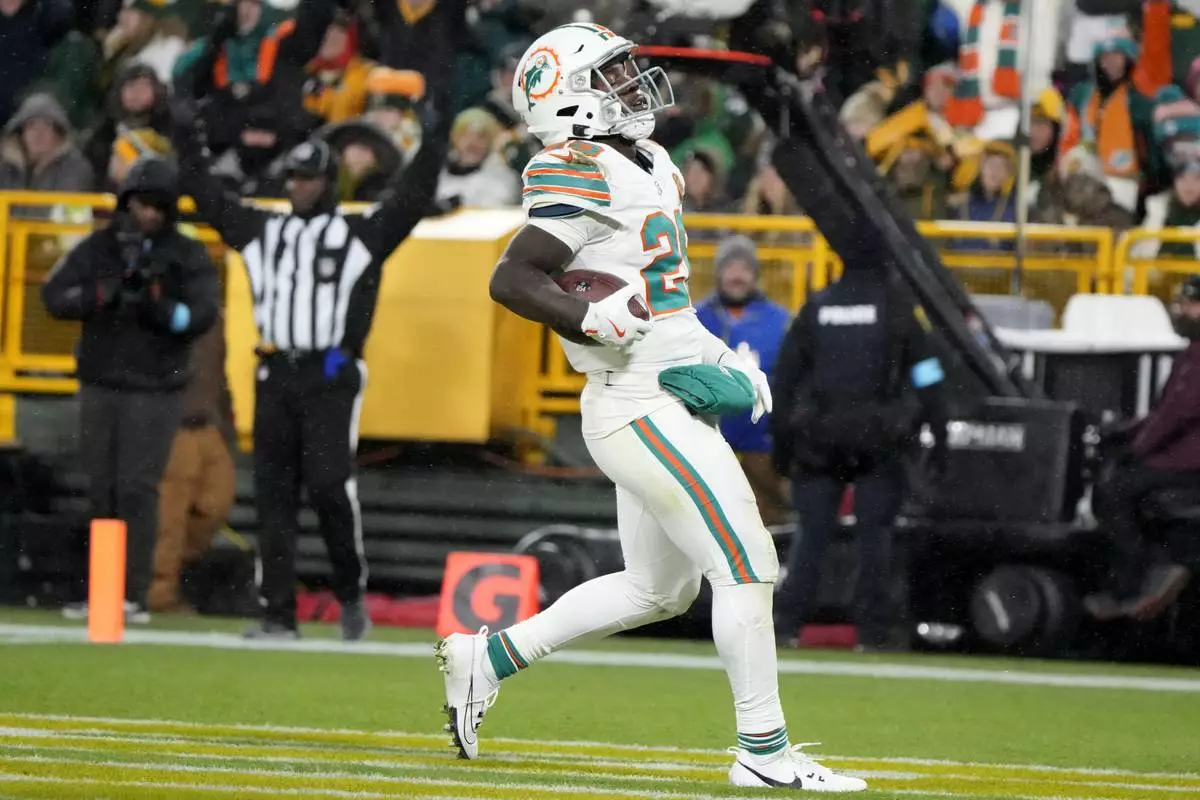
Miami Dolphins running back De'Von Achane scores on a 14-yard touchdown reception during the second half of an NFL football game against the Green Bay Packers Thursday, Nov. 28, 2024, in Green Bay, Wis. (AP Photo/Morry Gash)
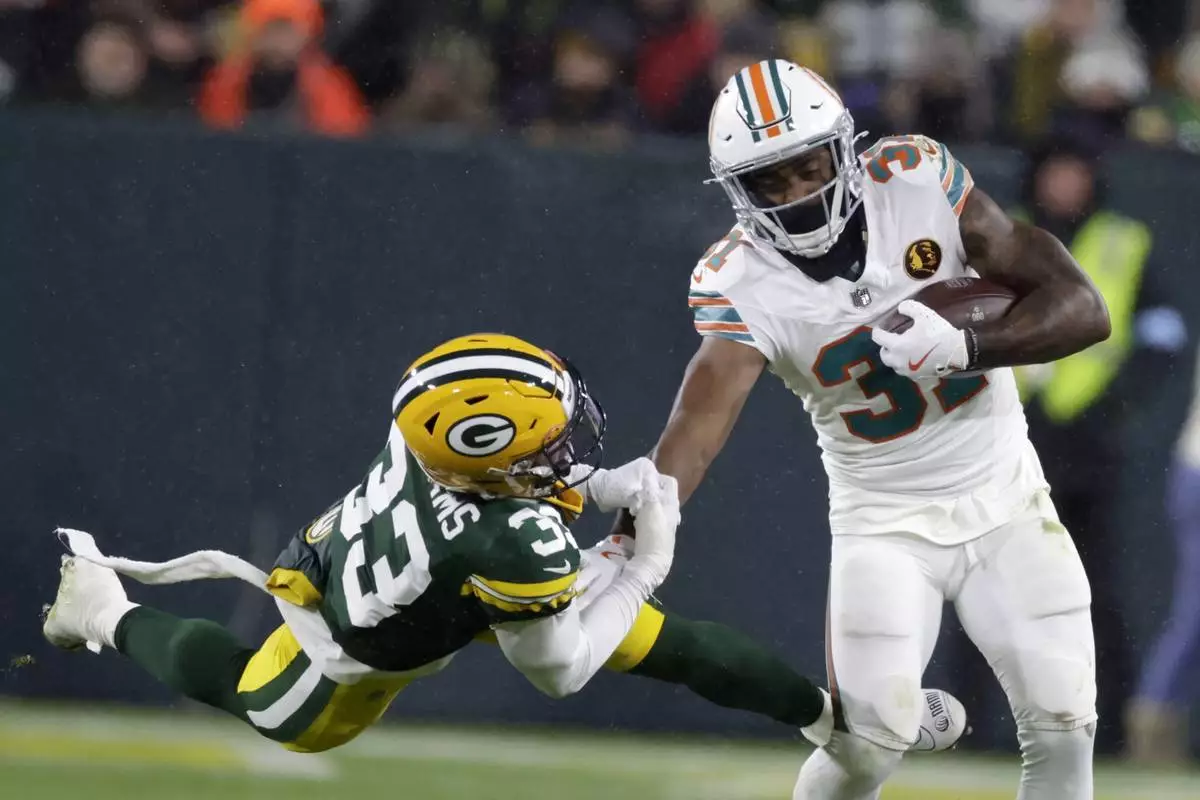
Miami Dolphins running back Raheem Mostert (31) tries to break a tackle by Green Bay Packers safety Evan Williams (33) during the second half of an NFL football game Thursday, Nov. 28, 2024, in Green Bay, Wis. (AP Photo/Matt Ludtke)
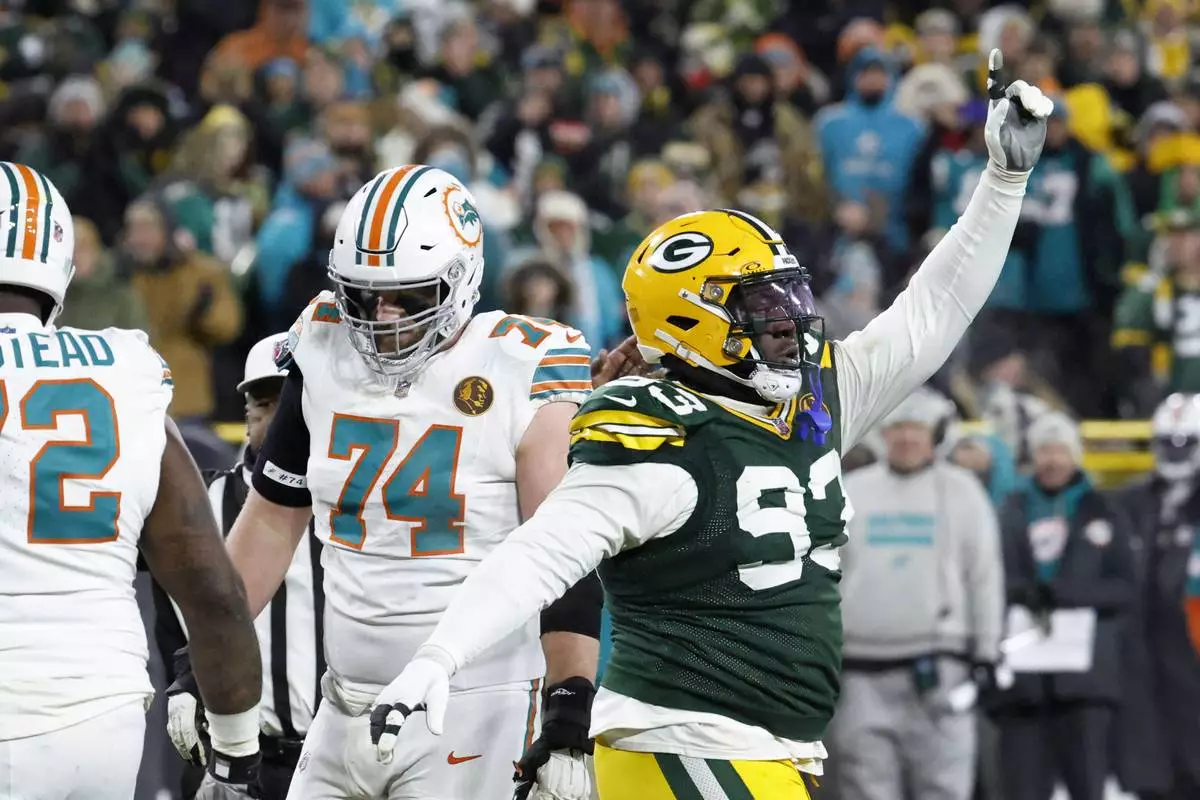
Green Bay Packers defensive tackle T.J. Slaton (93) celebrates in front of Miami Dolphins offensive tackle Liam Eichenberg (74) after a defensive stop during the second half of an NFL football game Thursday, Nov. 28, 2024, in Green Bay, Wis. (AP Photo/Mike Roemer)
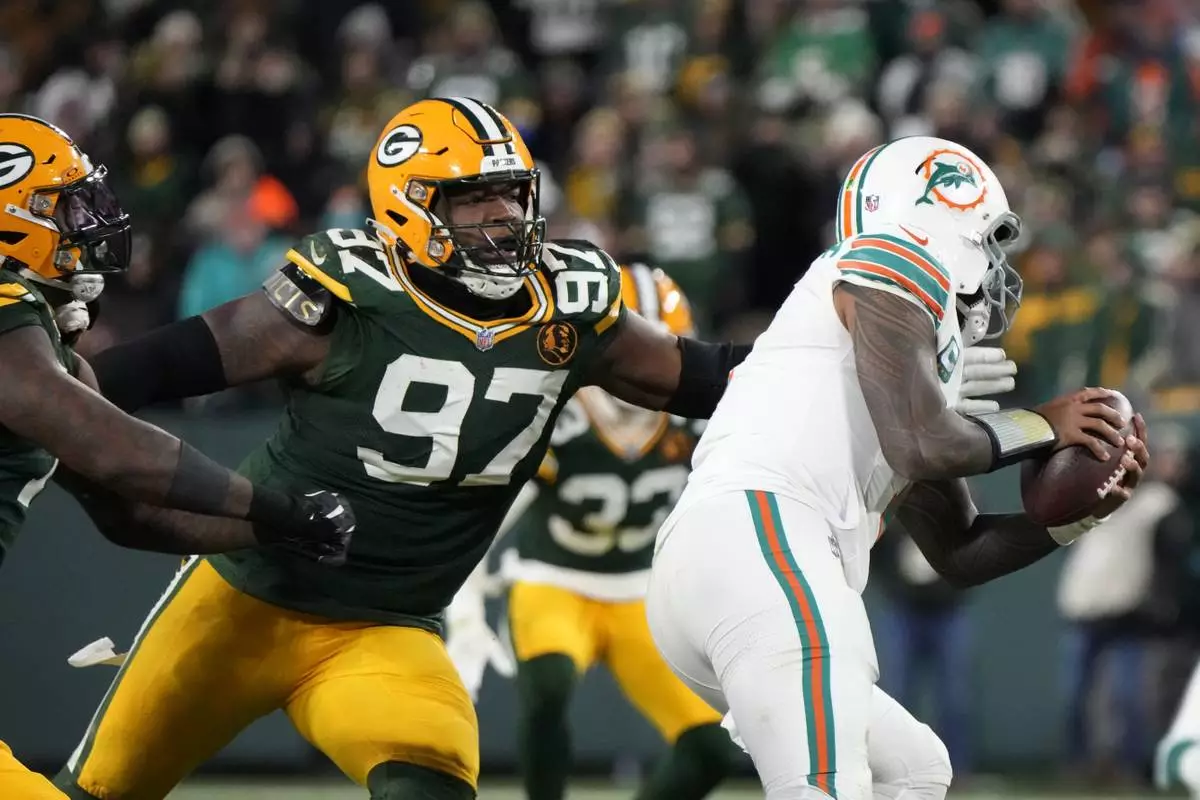
Green Bay Packers defensive tackle Kenny Clark (97) sacks Miami Dolphins quarterback Tua Tagovailoa during the second half of an NFL football game Thursday, Nov. 28, 2024, in Green Bay, Wis. (AP Photo/Morry Gash)
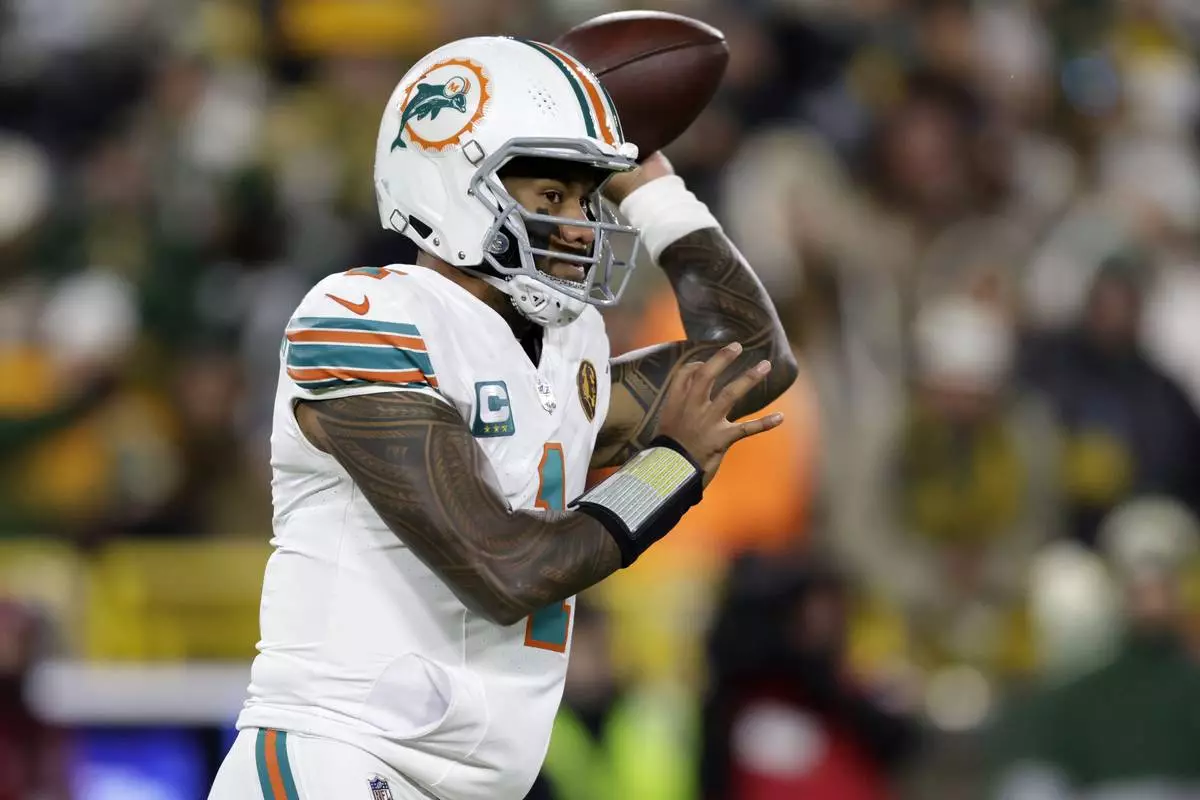
Miami Dolphins quarterback Tua Tagovailoa throws a pass during the first half of an NFL football game against the Green Bay Packers Thursday, Nov. 28, 2024, in Green Bay, Wis. (AP Photo/Matt Ludtke)
TOKYO (AP) — Embattled Japanese Prime Minister Shigeru Ishiba, who survived as leader after a major election loss by his governing coalition, promised Friday to work closely with the long-ignored opposition that is now the only way his minority government can stay in power.
Ishiba’s Liberal Democratic Party and its junior partner Komeito together lost a majority in the 465-seat lower house, the more powerful of Japan’s two-house parliament, in the Oct. 27 elections. He needs support from opposition parties to keep his fragile government alive. The election loss was blamed on voter anger over his party’s financial misconduct, and he is trying to quickly tackle reforms.
“We will thoroughly listen to other parties and form a consensus as broadly as possible as we sincerely and humbly seek to protect the safety and security of the people,” Ishiba said Friday in his first policy speech since his reappointment as prime minister after the election.
At home, he faces tough negotiations with the opposition. The LDP coalition has long forced through its favored legislation by taking advantage of its dominance in parliament, a routine set under ex-Prime Minister Shinzo Abe and criticized as autocratic.
Without a majority, Ishiba will struggle in coming months to gain consent from the opposition on the budget and other legislation, raising worry about a political deadlock. But experts say the situation could also lead to more public debate and transparency in the policy-making process.
Ishiba, known as a critic of the late Abe, may find that his minority government offers a chance to restore a more democratic way of deciding policies.
“I believe the way democracy should be is for each party to reflect diverse voices of the people and discuss policies sincerely and achieve better results," Ishiba said.
Ishiba's LDP has been cooperating closely with a smaller rising party, the conservative Democratic Party for the People, whose seats quadrupled to 28 in the October election under its popular leader, Yuichiro Tamaki. His proposal for raising the basic tax-free income allowance and increasing take-home wages has garnered support from low-income and younger voters. Ishiba's coalition has been negotiating toward achieving the proposals.
Ishiba said Friday he hopes to have “candid discussions” with U.S. President-elect Donald Trump when he takes office in January to further elevate the Japan-U.S. alliance as “the cornerstone of Japan’s diplomatic and security policies.” But he wants the relationship to be more equal.
He is expected to face tough demands from Trump that Tokyo pay more for the 50,000 U.S. troops stationed in Japan under a bilateral security pact.
Ishiba said he will propose to the United States the joint use of American bases and military facilities with Japan’s Self-Defense Forces. He will also seek to “resolve problems stemming from the American troop presence,” he said. Ishiba has advocated a revision to the Status of Forces Agreement that gives the United States the right to investigate accidents and crimes that occur on Japanese soil. It has been criticized by many as unequal.
He reiterated the importance of pursuing a significant buildup of Japan’s defense power to deal with growing threats from China, Russia and North Korea, while cooperating with the United States and other like-minded partners.
Ishiba also pledged to revitalize Japan’s economy, especially in suburban areas, to promote growth led by an increase in wages and investment, while building resilience to natural disasters — issues less likely to be opposed by the opposition. He recently began preparations for a long-pursued disaster ministry, planned for launch by March 2027.
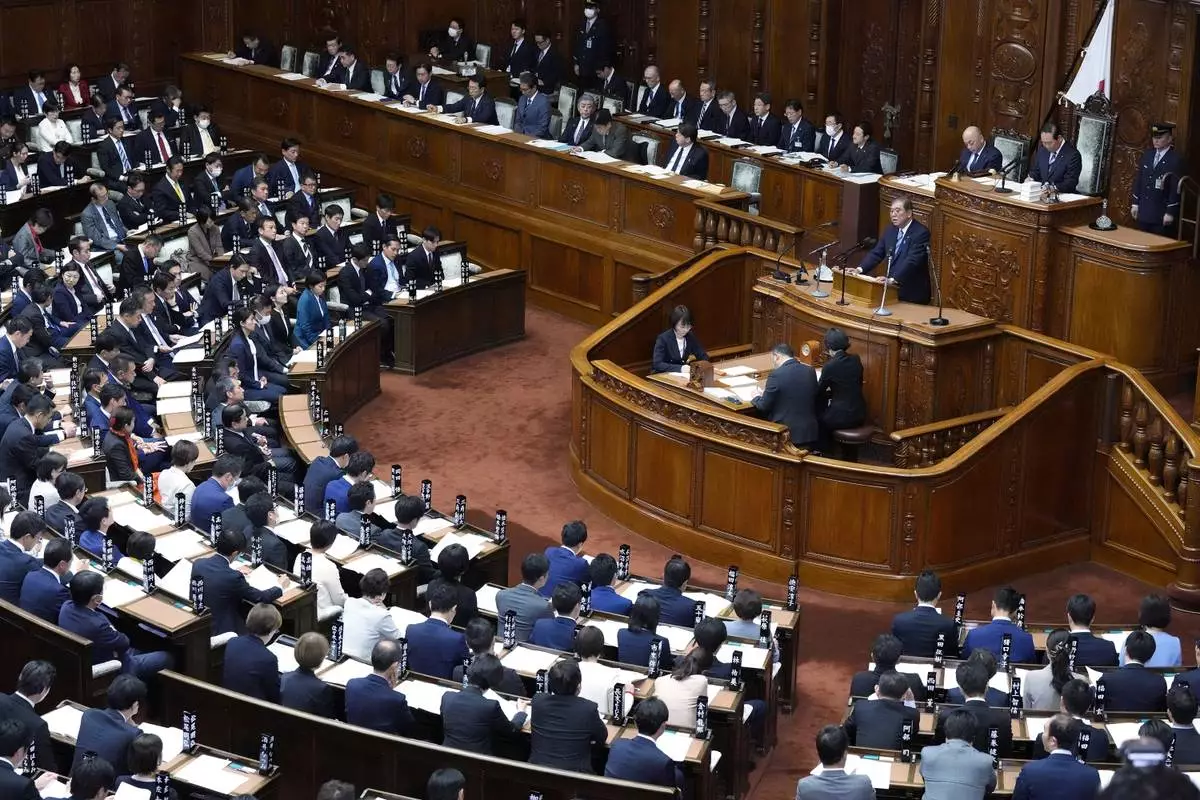
Japanese Prime Minister Shigeru Ishiba delivers his policy speech at the extraordinary session of parliament's lower house Friday, Nov. 29, 2024, in Tokyo. (AP Photo/Eugene Hoshiko)
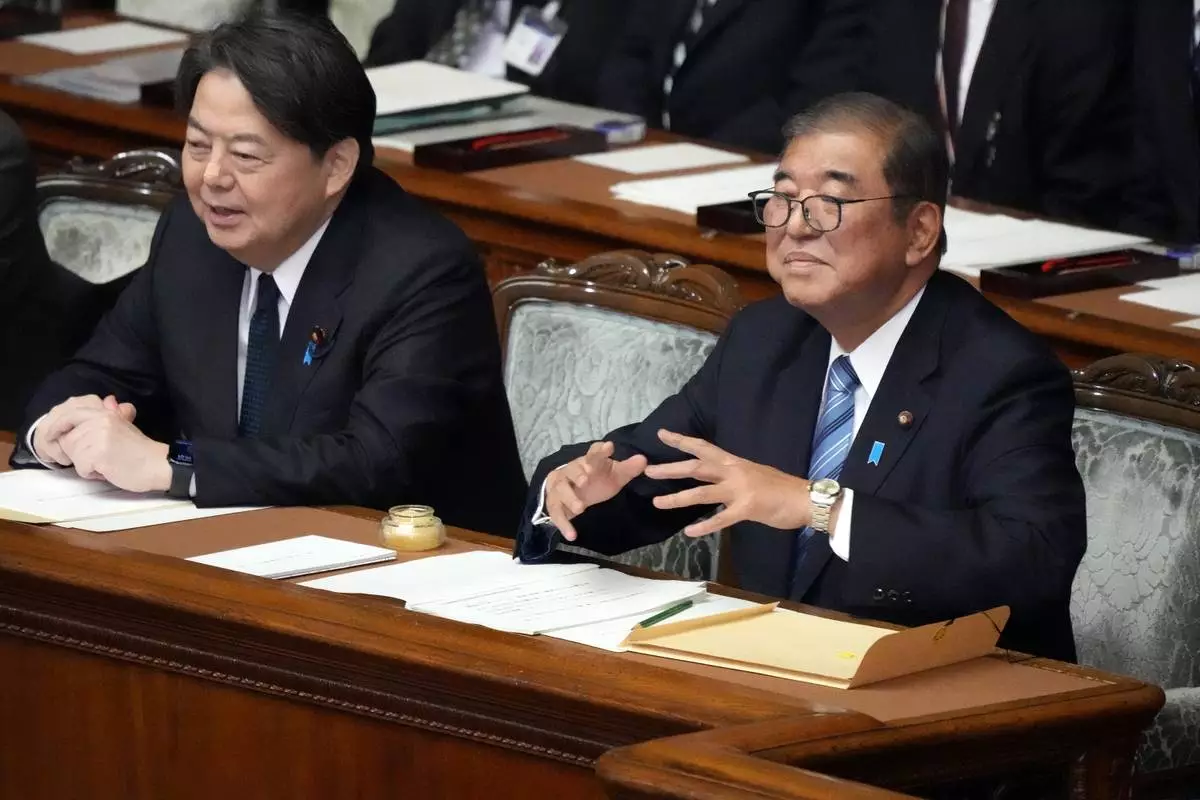
Japanese Prime Minister Shigeru Ishiba, right, gestures before delivering his policy speech at the extraordinary session of parliament's lower house Friday, Nov. 29, 2024, in Tokyo. (AP Photo/Eugene Hoshiko)
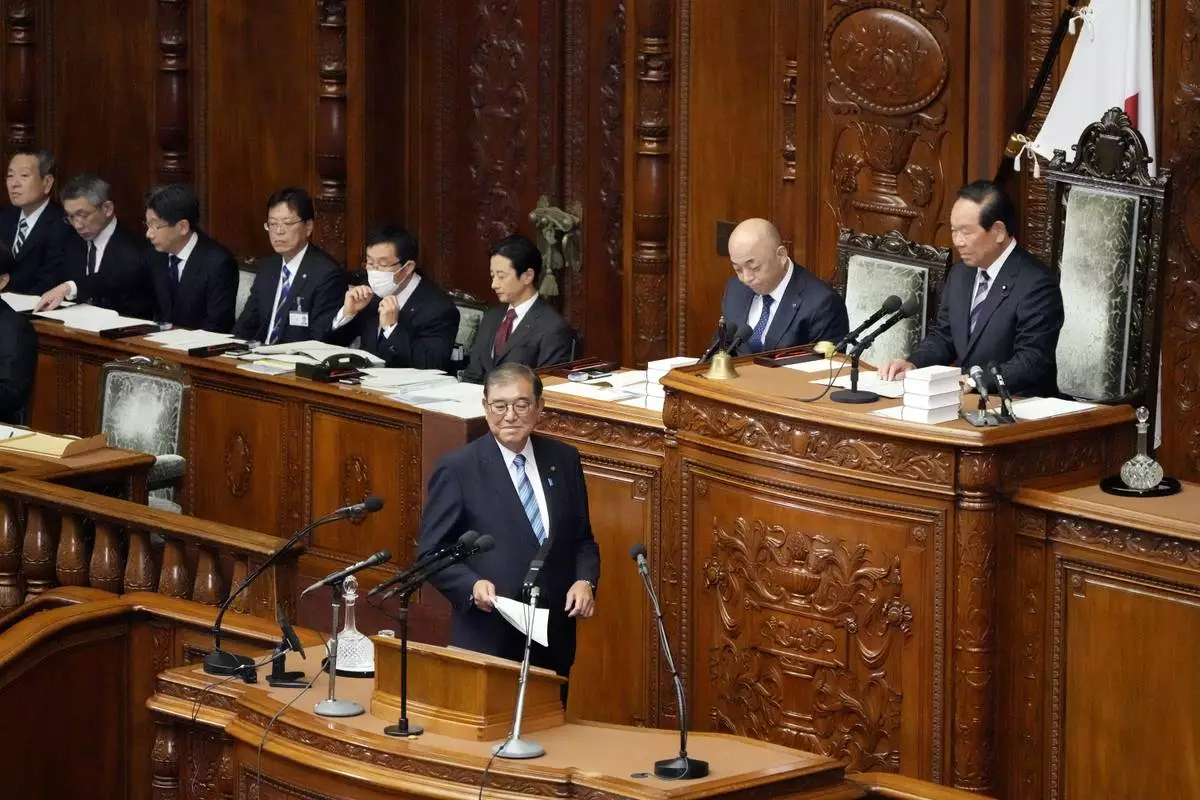
Japanese Prime Minister Shigeru Ishiba prepares to deliver his policy speech at the extraordinary session of parliament's lower house Friday, Nov. 29, 2024, in Tokyo. (AP Photo/Eugene Hoshiko)
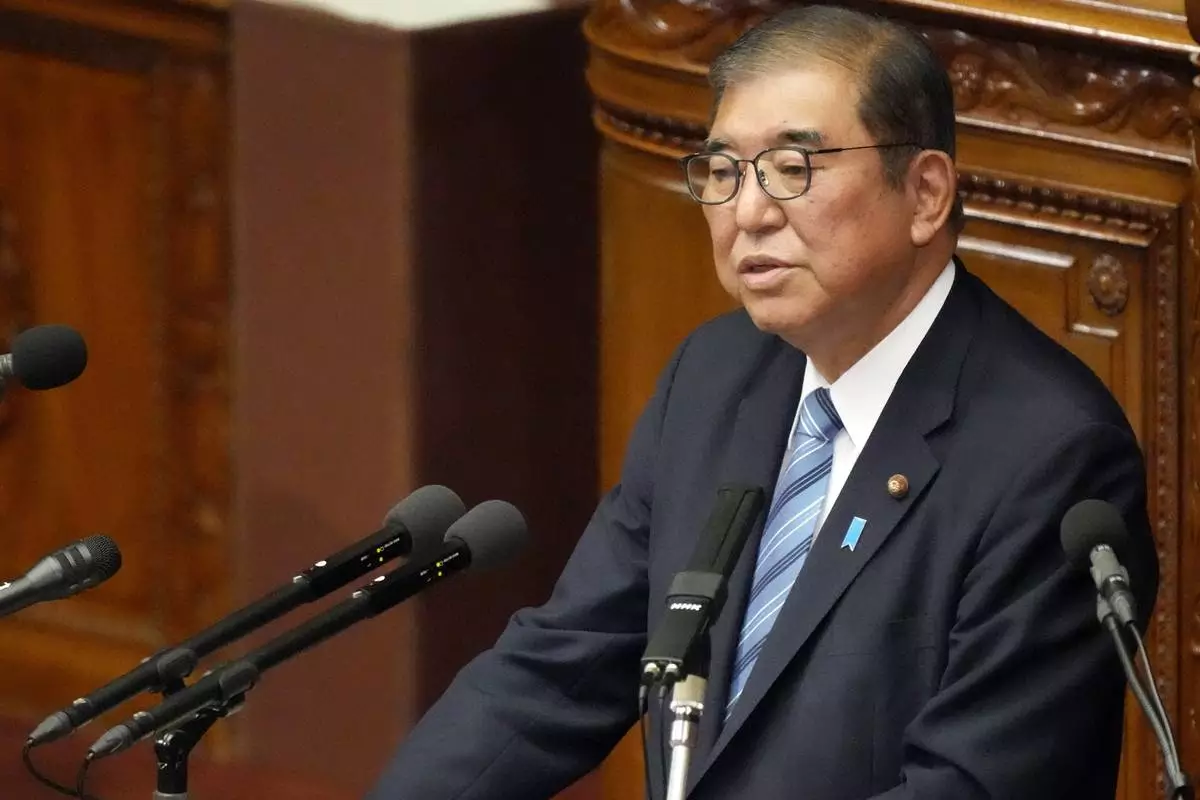
Japanese Prime Minister Shigeru Ishiba delivers his policy speech at the extraordinary session of parliament's lower house Friday, Nov. 29, 2024, in Tokyo. (AP Photo/Eugene Hoshiko)
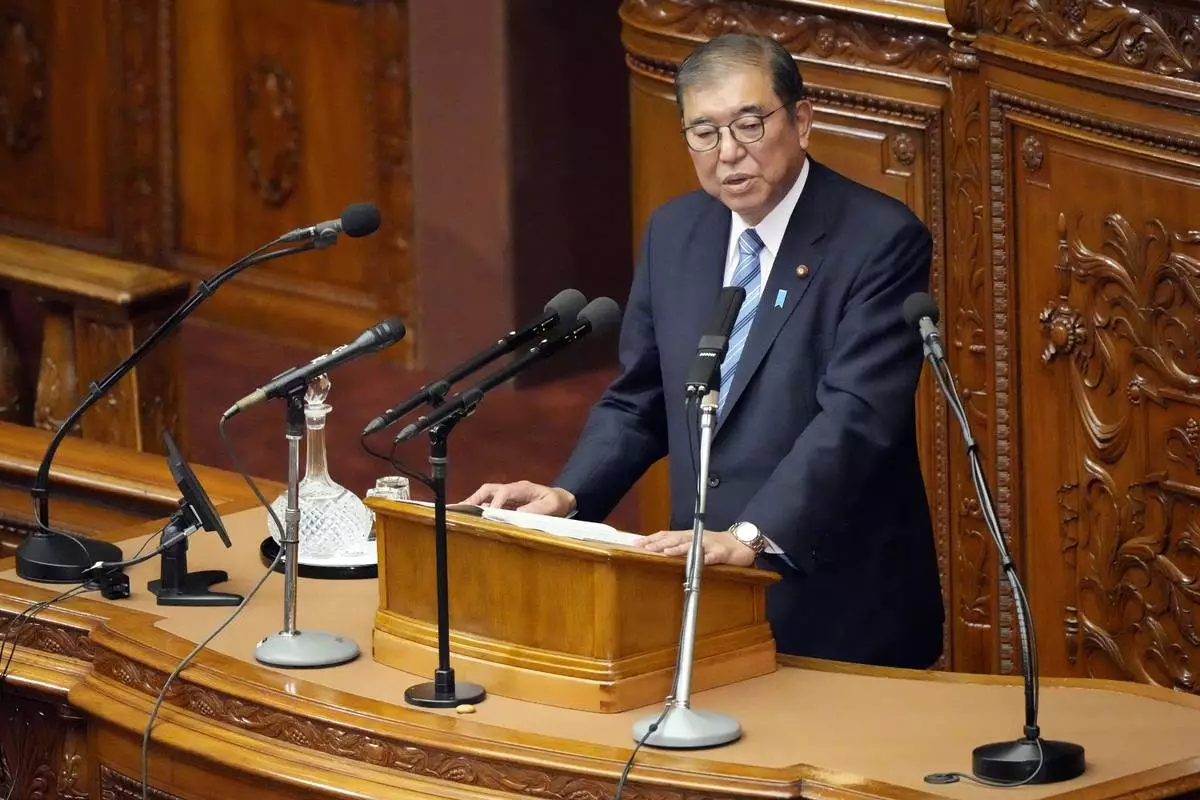
Japanese Prime Minister Shigeru Ishiba delivers his policy speech at the extraordinary session of parliament's lower house Friday, Nov. 29, 2024, in Tokyo. (AP Photo/Eugene Hoshiko)







